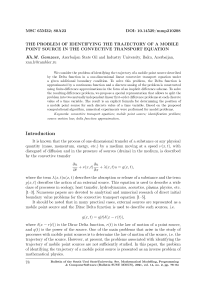The problem of identifying the trajectory of a mobile point source in the convective transport equation
Бесплатный доступ
We consider the problem of identifying the trajectory of a mobile point source described by the Delta function in a one-dimensional linear convective transport equation under a given additional boundary condition. To solve this problem, the Delta function is approximated by a continuous function and a discrete analog of the problem is constructed using finite-difference approximations in the form of an implicit difference scheme. To solve the resulting difference problem, we propose a special representation that allows to split the problem into two mutually independent linear first-order difference problems at each discrete value of a time variable. The result is an explicit formula for determining the position of a mobile point source for each discrete value of a time variable. Based on the proposed computational algorithm, numerical experiments were performed for model problems.
Convective transport equation, mobile point source, identification problem, source motion law, delta function approximation
Короткий адрес: https://sciup.org/147235243
IDR: 147235243 | УДК: 519.63 | DOI: 10.14529/mmp210208
Список литературы The problem of identifying the trajectory of a mobile point source in the convective transport equation
- Anderson D., Tannehill K., Pletcher R. Computational Fluid Mechanics and Heat Transfer. New York, Taylor and Francis, 1984.
- Whitham G.B. Linear and Nonlinear Waves. New York, John Wiley and Sons, 1974.
- Roache P.J. Computational Fluid Dynamics. Albuquerque, Hermosa Publishers, 1976.
- Samarskii A.A. The Theory of Difference Schemes. New York, Marcel Dekker, 2001.
- Bugai D.A. Locally One Dimensional Difference Scheme for the Convective Diffusion Equation. Journal of Mathematical Sciences, 1999, vol. 72, no. 2, pp. 3021-3024. DOI: 10.1007/BF01252187
- Alifanov O.M., Artioukhine E.A., Rumyantsev S.V. Extreme Methods for Solving Ill-Posed Problems with Applications to Inverse Heat Transfer Problems. New York, Begell House, 1995.
- Samarskii A.A., Vabishchevich P.N. Numerical Methods for Solving Inverse Problems of Mathematical Physics. Berlin, Walter de Gruyter, 2008.
- Sara Zahedi. Delta Function Approximations in Level Set Methods by Distance Function Extension. Journal of Computational Physics, 2010, vol. 229, no. 6, pp. 2199-2219. DOI: 10.1016/j.jcp.2009.11.030
- Vabishchevich P.N. Computational Algorithms for Solving the Coefficient Inverse Problem for Parabolic Equations. Inverse Problems in Science and Engineering, 2016, vol. 24, no. 1, pp. 42-59. DOI: 10.1080/17415977.2014.993984
- Gamzaev Kh.M. A Numerical Method to Solve Identification Problem for the Lower Coefficient and the Source in the Convection-Reaction Equation. Cybernetics and Systems Analysis, 2018, vol. 54, no. 6, pp. 971-976.
- Gamzaev Kh.M. On One Inverse Problem of Phase Transformation in Solids. Technical Physics, 2018, vol. 63, no. 8, pp. 1087-1091.


